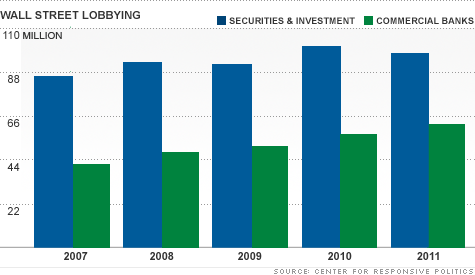Search News

WASHINGTON (CNNMoney) -- Financial industry spending to influence Washington topped $150 million for the second year in a row, with emphasis shifting to regulators of the Dodd-Frank reform law, according to watchdog groups.
Lobbying by investment firms hit $98 million, down a little from the record $101 million spent in 2010 when the Wall Street reform bill became law, according to the Center for Responsive Politics.
Big commercial banks, including those with Wall Street units, spent more in 2011 -- $61.5 million, up from the $56.6 million in 2010.
Combined, the two industry segments spent $159.5 million, up from $157.6 million the year before.
After lawmakers passed Dodd-Frank, ushering in unprecedented changes to the way Wall Street does business, financial firms turned their focus from Capitol Hill to the regulatory agencies.
"The Dodd-Frank bill was 2,300 pages long and created more than 240 rule-making procedures, so it's not surprising to see that Wall Street continued to spend at this level," said Lee Drutman, a data analyst for another watchdog group that tracks lobbying, the Sunlight Foundation. "These are really complicated, technical issues. And the more complicated it is, the more popular and powerful these lobbyists are."
Some of the biggest spenders were the Securities Industry and Financial Markets Association, which spent $5.2 million on lobbying, and the American Bankers Association, which spent $8.8 million, according to the report.
Among commercial banks, Wells Fargo (WFC, Fortune 500) spent $7.8 million, up from $5.4 million in 2010, and JP Morgan Chase (JPM, Fortune 500) spent $7.6 million, up from $7.4 million the year before.
Goldman Sachs (GS, Fortune 500) spent $4.4 million on lobbying in 2011, down slightly from $4.6 million in 2010, and Morgan Stanley (MS, Fortune 500) spent $2.4 million, below the $2.8 million spent the prior year.
Goldman Sachs, Morgan Stanley and Wells Fargo declined comment. Efforts to get comment from the Securities Industry and Financial Markets Association, the American Bankers Association, and JPMorgan Chase were not immediately successful.
Wall Street's concerns in Washington included the amount of risk the mortgage industry might have to keep when buying and selling mortgages, and the amount in capital cushions banks must keep on hand to prevent another system-wide financial collapse.
Another big topic: Making derivative trades safer and more transparent.
The Treasury Department, the Federal Deposit Insurance Corp., the Securities and Exchange Commission and the Commodity Futures Trading Commission all reported dozens of in-person and over-the-phone teleconferences between staffers and financial firms or their attorneys in 2011, according to an analysis of the records by the Sunlight Foundation.
Goldman Sachs sent lobbyists and attorneys to the CFTC more than 30 times in 2011 to talk about complicated derivatives rules, according to commission records. Barclays got face time at the CFTC about 20 times in 2011. JPMorgan Chase got face time with CFTC staff 6 times, and Bank of America's Merrill Lynch logged 5 meetings.
One big concern for Wall Street banks last year was the Volcker rule, named for former Federal Reserve chief Paul Volcker. That ruleaims to rein in how banks use their own accounts to chase profits -- so-called proprietary trading.
But the draft rule regulators are working on is easier on the banks than the originally proposed ban on proprietary trading.
The rule first got watered down in Congress. Regulators have also narrowed the rule to allow big banks to continue to hedge and make trades for clients looking to make big market bets. ![]()
| Overnight Avg Rate | Latest | Change | Last Week |
|---|---|---|---|
| 30 yr fixed | 3.80% | 3.88% | |
| 15 yr fixed | 3.20% | 3.23% | |
| 5/1 ARM | 3.84% | 3.88% | |
| 30 yr refi | 3.82% | 3.93% | |
| 15 yr refi | 3.20% | 3.23% |
Today's featured rates:
| Latest Report | Next Update |
|---|---|
| Home prices | Aug 28 |
| Consumer confidence | Aug 28 |
| GDP | Aug 29 |
| Manufacturing (ISM) | Sept 4 |
| Jobs | Sept 7 |
| Inflation (CPI) | Sept 14 |
| Retail sales | Sept 14 |